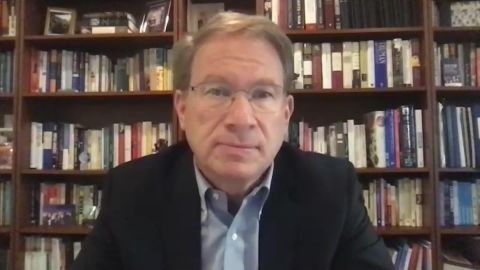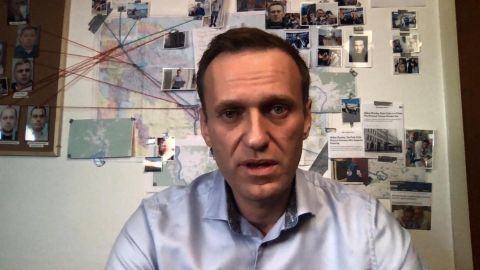Read Transcript EXPAND
CHRISTIANE AMANPOUR: 2020 has been a historic year. And “The Atlantic” has been on the front lines of it all. It’s broken new ground on COVID-19, first warning readers about the lack of preparation for a pandemic two years ago and an explosive report from editor-in-chief, Jeffrey Goldberg, about how Trump called fallen soldiers losers made shockwaves around the world. Now, here is Goldberg talking with our Walter Isaacson about the major news stories of this unforgettable year.
WALTER ISAACSON: Thanks, Christiane. And, Jeff Goldberg, welcome to the show.
JEFFREY GOLDBERG, EDITOR-IN-CHIEF, THE ATLANTIC: Thank you.
ISAACSON: Yesterday was an amazing and as one of our discontent, we finally got the Electoral College to say it’s over. This election is sealed. And secondly, the first person got a shot for the coronavirus. Do you think our long national nightmare might actually be ending?
GOLDBERG: I guess in the spirit of the holiday season I’m supposed to say yes, but no. How is that for a depressing opening? I mean, first of all, going back to the coronavirus just for a minute, you know, many more people, unfortunately, are going to die between now and 70 percent vaccination levels or whatever it is exactly that we need in order to sort of put this behind us, for this particular pandemic behind us. So, that’s one issue. And the second issue goes to the Electoral College issue that you’re talking about. You saw yesterday after this was ratified again and again — Joe Biden is the only person to have won the presidency 15 times, and he’s won it over the last two months. Each time, every time that a lawsuit has been thrown out, every time the Supreme Court says, no thank you, he’s won again. This is a formal win, I guess you could say, but you saw many Republicans, including Republican officials, either uncharitably acknowledge the existence of the Electoral College or still find ways to avoid actually acknowledging that Joe Biden is the legitimate president-elect.
ISAACSON: Well, that reminds me of an article that Anne Applebaum wrote in “The Atlantic,” which says that history will judge the complicit. Why is it that so many members of the GOP have become quisling enablers of the undermining of democracy?
GOLDBERG: Well, I mean, A, you — we should — we need to ask those Republicans — those Republican legislators every day what it is that they are doing and get their answers on the record. I mean, that’s my journalist analysis of the issue. But, you know, we all have our guesses. You know, one, they have discovered that Donald Trump is popular with the base and they also have discovered the price of crossing Donald Trump, ask Bob Corker, ask Jeff Flake, ask, you know, intermittently, Ben Sasse and so on, nobody wants to get crosswise with Donald Trump. He remains a powerful — the most powerful figure in the Republican Party and he’s working very, very hard to maintain that status after January 20th. I do think sometimes because it sounds silly, we underplay the fact that nobody, no human, Republican, Democrat, white, black, otherwise, wants to be excoriated on Twitter all day long, and they are scared of that. But basically, you know, their profession is politics. Their base and their individual congressional districts and their states, their base is loyal to some great degree to Donald Trump and you don’t go against Donald Trump. And so, if Donald Trump says, follow me off this Democrat — anti- Democratic cliff, some people follow him off the anti-Democratic cliff.
ISAACSON: Exhibit A of this is somebody, a Republican that you know quite well, Senator Lindsey Graham, and he said to “The Atlantic” at one point that, jousting with the tea party was more fun than I’ve ever had in politics. He used to be an acolyte of John McCain and called Trump a race- baiting xenophobic religious bigot and then totally switched over. First of all, how do you explain that? And secondly, do you think he will now, because of his desire to be near power, flip the other way?
GOLDBERG: He’s both a mystery and not a mystery. The mystery is how do someone switch allegiances from John McCain to his opposite, Donald Trump, right? I mean, that’s a short way of putting it. And so, this has to do with matters of the soul. On the other hand, Lindsey Graham has said to me and others, you know, if there’s one thing you know about me it’s that I like to be relevant. I’m paraphrasing but it’s essentially his argument. By the way, it’s an argument of many politicians. Maybe he’s more honest in sort of talking about the flame’s attraction to the moth. The — and so, with Lindsey Graham you see somebody who can shapeshift according to whatever the father figure in the Republican Party at the moment wants. And so, I wouldn’t be surprised at all if Trump somehow fades a bit from public life that Lindsey Graham, six months, a year from now, a year and a half from now, is doing some kind of useful work with the Biden administration. He also likes Joe Biden, another kind of father figure, if you will. And so, the man is not a stable isotope.
ISAACSON: Your famous piece this year was about a lot of people in the military saying that Donald Trump referred to military as — people who got killed as loser and as suckers. Tell us a little bit more about that piece and why those people came out and talked to you.
GOLDBERG: Well, I mean, I want to be careful here because one has to protect sources. I granted them anonymity. They are not anonymous to me, obviously. There is — I will make this general observation that there is very, very – – as far as I can tell, there’s almost no one in position of command in the United States Military or people who have recently departed command roles in the United States Military who has any faith or trust in Donald Trump. He scares them actively, and that’s quite apart from his insulting attitude towards service. You know, suckers and losers got a lot of attention, but there were many other details in that story that were also quite appalling, you know, and also revealing. I mean, this is the interesting part. After Donald Trump had been briefed by General Dunford, he was the former chairman of the Joint Chiefs of Staff, and Dunford had left the situation room. Trump turned to a group of aides and essentially said, the guy is very smart. I don’t get it. Why did he join the military? There’s this assumption that people who serve, generally, people who do things for others are suckers. If they don’t — if they are not out for themselves, if they are not out to make money, money is not their North Star, then he doesn’t have, it seems, the intellectual capacity to imagine why they do such things. And we’ve seen this again and again and also, obviously, much of the story was about his relationship, his psychological relationship with John McCain. There’s a guy he truly didn’t understand, who he truly couldn’t charm and so, he went and, you know, really, pretty vicious ways against John McCain. And it’s just one of the many interesting and bizarre manifestations of his personality in office.
ISAACSON: Do you think he remains a major force in American politics?
GOLDBERG: He was a major force in American politics before this, honestly. Birtherism, remember? It seems like a distant issue. But, A, birtherism became a serious challenge for the Obama administration, for President Obama’s legitimacy in some quarters of the American public, and it was really the introduction by a major cultural figure, Donald Trump, of conspiracism into the national conversation. So, he was there before. I have no reason to believe that he won’t continue, even on inauguration day, to create doubt about the legitimacy of the Biden presidency and make his — obviously, being an ex-president, you don’t have the same sway and the same bully pulpit and the same access to audiences that you used to have. But I can’t imagine a situation in which he would fade, and obviously, I don’t think anybody can imagine a situation in which he would willingly fade and become like Jimmy Carter and build houses for poor people or Barack Obama and write thoughtful memoirs, you know. I think he is what he is and he’ll be that way until he can’t do it anymore.
ISAACSON: Joe Biden has said he not only wants to heal the nation but thinks he can walk across party aisles. Do you think that’s possible?
GOLDBERG: I don’t have more insight into that than he has. I think when you’re a politician, when you’re a successful politician, you, by nature, have to be optimistic and I think Joe Biden is one of the world’s great optimists. It doesn’t seem likely with the Trumpism still a salient force in Republican politics that it would very easy for to reach across the aisle. Now, look, he knows these guys very well. He’s a senator, obviously. His — half his life was spent in the Senate. If anyone on the Democratic side is going to be able to charm Mitch McConnell or work out deals with the elderly white men who run the Republican Senate caucus, it’s going to be Joe Biden, but it doesn’t — this is not the 1980s. This is not Tip O’Neill and Ronald Reagan. This is not the Senate that he himself, Joe Biden himself, has gotten in trouble for for remembering overly fondly. And so, I guess if you’re putting money on it, you wouldn’t put that much money on it.
ISAACSON: You add in “The Atlantic,” a piece that sort of said, you’re likely to get the coronavirus. Tell me about your coverage of coronavirus and what type of warnings that people at “The Atlantic” were giving.
GOLDBERG: Well, you know, it’s interesting. I was just reading the other day, and I’m writing something about this shortly. We published a piece in January by a little-known freelancer contributor named Ron Klain who basically predicted everything that’s happening now and we had asked Ron Klain in January — of course Ron Klain is coming in as chief of staff of Joe Biden. We asked him to write about his experience combating Ebola, he was the Ebola czar in the Obama administration and he called it. This is January, where he even called it to the degree of noting that it’s very likely that Anthony Fauci will get cross-wise with Donald Trump because Fauci is both adamant and a science first sort of fellow. So, I’m pretty proud of “The Atlantic’s” record of publishing stories early that called where we’re going. Two years ago, Ed Young, one of our great science correspondents, wrote a piece called literally “The Coming Pandemic” and outlined all the ways in which the government wasn’t ready, the government was ready and then talked about the incredible importance of Donald Trump in what could be a future drama, and he was right there. Like any magazine, and you know this as an ex-magazine editor, magazines unlike newspapers have to focus on the past and the future. The present is more the realm of newspapers. And so, what we’ve been trying to do is look back at the history of pandemics and the history of pandemic response and also sort of casting forward and saying, where are we heading on this? Sarah Zhang, another great science correspondent, has focused relentlessly on vaccines and is a great guide for people on what to expect in the coming months. And so, we’re really trying to cast forward and explain both what might be coming and also what it all means.
ISAACSON: There was a confluence of the age of paranoia, conspiracy and misinformation on the one hand and coronavirus hitting on the other. How did those intertwine?
GOLDBERG: Well, in really negative ways obviously. And I don’t think we’re in the beginning of that particularly chapter because we’re about to find out, and I’ve been asking people in the incoming Biden administration, I said, how do you convince the 70 million plus Trump voters to roll up their sleeves and get this vaccination? Now, obviously many people will, but there’s such bad information out there about vaccination and this pre-dates obviously coronavirus, but there’s such bad administration already about vaccinations and, you know, the alleged, discredited connection to autism among other things that, I think, the medical community is already a little bit on the back foot in dealing with this, but — and this is going to be a big — if you asked before about Donald Trump and whether he’s going to remain a salient figure, it’s going to be very interesting to see what he has to say about vaccination in the coming months. But I think you have a terrible confluence where you have a need for the public to participate in a accomplishing health measure and roll up their sleeves and do something with widespread societal mistrust, and it’s just a bad combination. And I don’t think anyone, Biden administration, incoming Biden administration or anyone else, has the answer, how do you convince someone who believes that vaccines are part of a broad conspiracy to actually get vaccinated? Now, of course, we know from the science that not everyone in America has to be vaccinated in order achieve a kind of reach herd immunity, but you need 70-ish percent to do that. And so, it’s going to be a difficult and strange several months.
ISAACSON: The big piece that just got posted in “The Atlantic” is the about how COVID will change science forever. Explain that to me.
GOLDBERG: We haven’t really gotten our hands around yet the size and scope of this vaccination program. I, by the way — I mean, I’ve been thinking about this and thinking about trying to get more articles on this subject. We’re not quite thinking about this in Manhattan Project size terms, but I’m hopeful, and I want to see more writing on this. I haven’t seen yet pieces that describe what we’re going to do to prevent this from every happening again. I mean, what kinds of global infrastructures, not only just national infrastructures, we have to build in order to prevent this from happening. I’m keenly interested, for instance, in issues related to the CDC and the FDA. Until March of this year or February of this year, I assumed, like many Americans, that these institutions were the goal standard. And indeed, you and I both know this that across the world, many countries don’t have CDCs and FDAs, and one of the reasons they don’t have these kinds of organizations is because we have it. We do the work. Britain, a couple other countries do the serious work. And I think it’s been an incredibly disturbing — I’ve been thinking about this a lot, incredibly disturbing to think that our CDC and FDA in their current manifestations are not necessarily the gold standard anymore. And so, rebuilding that and rebuilding the trust that one needs in those organizations, that’s going to be Manhattan Project of the coming years. I’m just fascinated by that.
ISAACSON: Jeffrey Goldberg, thanks so much for joining us.
GOLDBERG: Thank you, Walter.
About This Episode EXPAND
Russian opposition leade Alexey Navalny tells Christiane about the poison plot that nearly killed him. Veteran Palestinian official Hanan Ashrawi explains why she’s resigning from the Palestine Liberation Organization. Jeffrey Goldberg, editor-in-chief of The Atlantic, joins Walter Isaacson to reflect on an unforgettable year.
LEARN MORE


